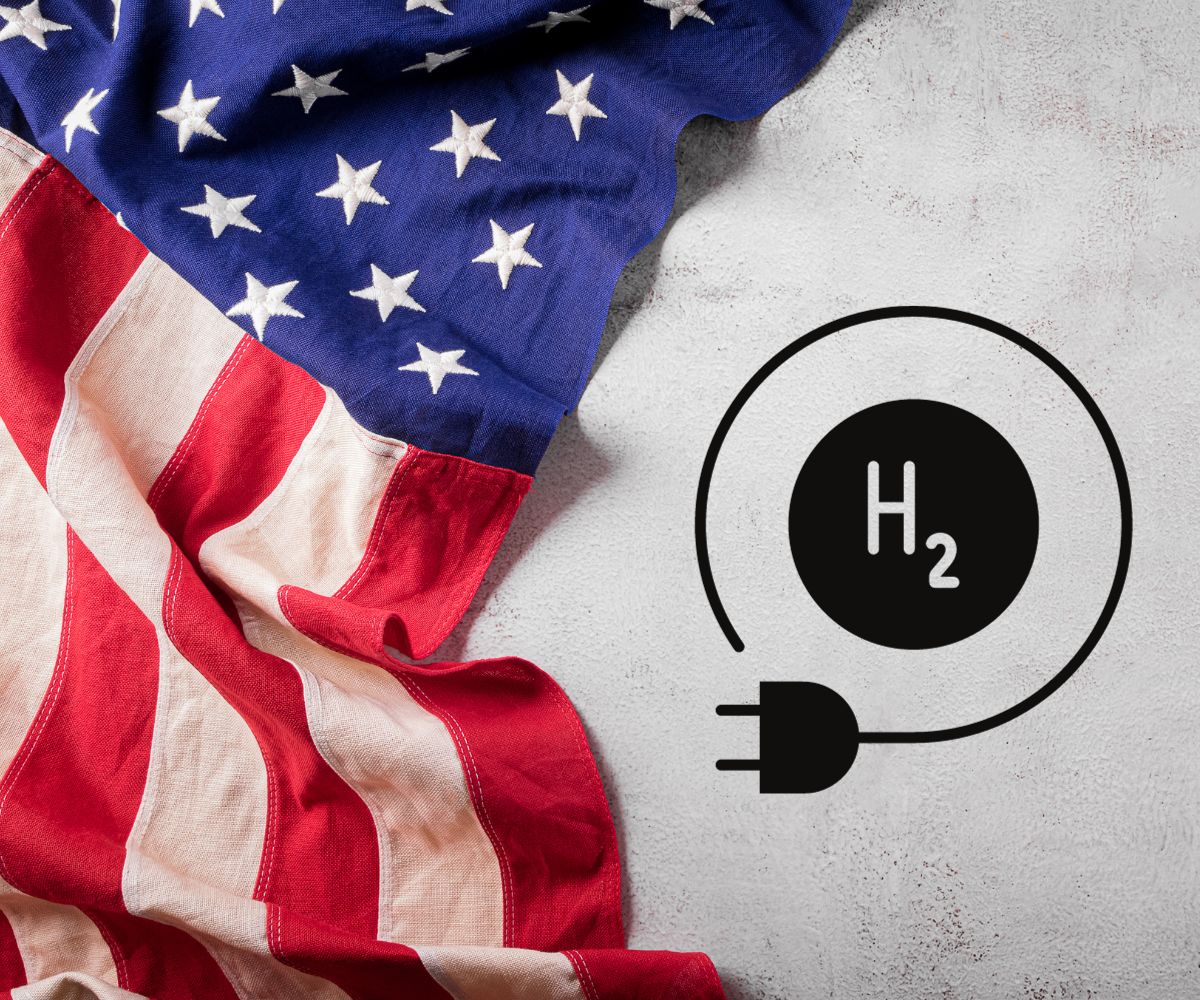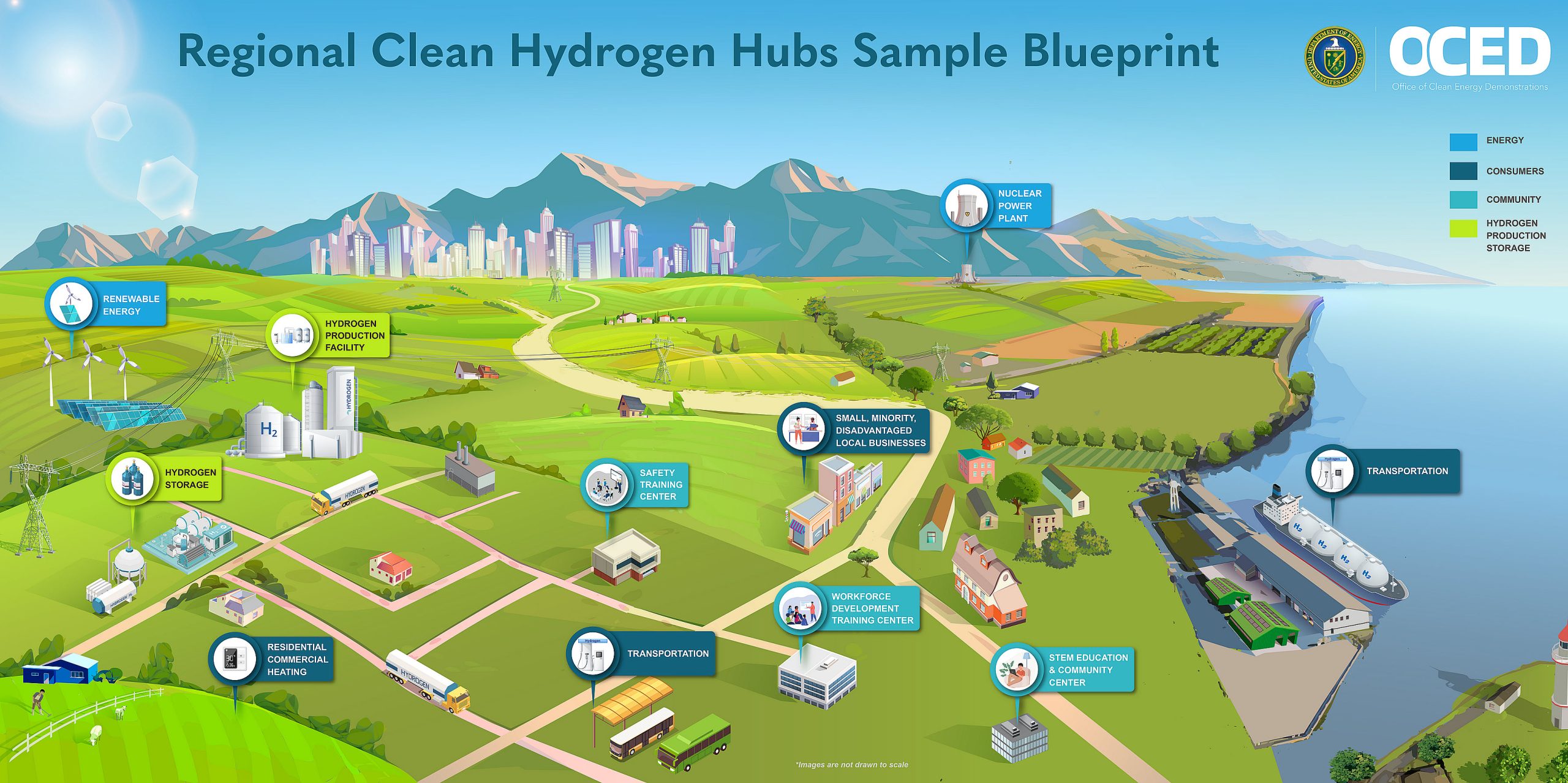
$7 Billion Pledged for Clean Hydrogen Hubs by Biden-Harris Administration
October 13, 2023The Biden-Harris administration is injecting $7 billion into seven regional clean hydrogen hubs. The aim is to produce over three million metric tons of clean hydrogen annually, trigger over $40 billion in private investments, and create tens of thousands of jobs.
Unpacking the Hydrogen Hubs and Funding Structure
Mid-Atlantic Hydrogen Hub (MACH2)
- States Involved: Pennsylvania, Delaware, New Jersey
- Key Features: Decarbonization, repurposing historic oil infrastructure, development of renewable hydrogen production facilities
- Job Creation: 20,800 direct jobs (14,400 construction jobs and 6,400 permanent jobs)
- Funding: Up to $750 million
Appalachian Hydrogen Hub (ARCH2)
- States Involved: West Virginia, Ohio, Pennsylvania
- Key Features: Producing low-cost clean hydrogen from natural gas, development of hydrogen pipelines, fueling stations, and permanent CO2 storage
- Job Creation: Over 21,000 direct jobs (over 18,000 construction jobs and over 3,000 permanent jobs)
- Funding: Up to $925 million
California Hydrogen Hub (ARCHES)
- State Involved: California
- Key Features: Production of hydrogen exclusively from renewable energy and biomass, decarbonizing public transportation, heavy-duty trucking, and port operations
- Job Creation: An expected 220,000 direct jobs (130,000 construction jobs and 90,000 permanent jobs)
- Funding: Up to $1.2 billion
Gulf Coast Hydrogen Hub (HyVelocity)
- State Involved: Texas
- Key Features: Large-scale hydrogen production from natural gas with carbon capture and renewables-powered electrolysis
- Job Creation: Approximately 45,000 direct jobs (35,000 construction jobs and 10,000 permanent jobs)
- Funding: Up to $1.2 billion

Heartland Hydrogen Hub
- States Involved: Minnesota, North Dakota, South Dakota
- Key Features: Decarbonization of the agricultural sector’s fertilizer production, advancement of clean hydrogen use in electric generation and cold climate space heating
- Job Creation: Upwards of 3,880 direct jobs (3,067 construction jobs and 703 permanent jobs)
- Funding: Up to $925 million
Midwest Hydrogen Hub (MachH2)
- States Involved: Illinois, Indiana, Michigan
- Key Features: Decarbonization through strategic hydrogen uses including steel and glass production, power generation, refining, heavy-duty transportation, and sustainable aviation fuel
- Job Creation: 13,600 direct jobs (12,100 construction jobs and 1,500 permanent jobs)
- Funding: Up to $1 billion
Pacific Northwest Hydrogen Hub (PNW H2)
- States Involved: Washington, Oregon, Montana
- Key Features: Production of clean hydrogen exclusively from renewable sources, use of electrolyzers to reduce the cost of hydrogen production
- Job Creation: More than 10,000 direct jobs (8,050 construction jobs and 350 permanent jobs)
- Funding: Up to $1 billion

Image Credit: www.energy.gov
Additional Clean Hydrogen Programs by the Department of Energy
- Clean Hydrogen Electrolysis Program: Will receive $1 billion
- Clean Hydrogen Manufacturing and Recycling R&D activities: Will receive $500 million
The investment in these hydrogen hubs and programs underscores the administration’s commitment to clean energy and job creation. It also highlights the potential of hydrogen as a key player in the future of energy production.
Biden’s Administration Commits a Total of $65 Billion to Investments in Clean Energy
The Bipartisan Infrastructure Law, endorsed by President Biden, allocates $65 billion total towards clean energy initiatives under the jurisdiction of the Department of Energy (DOE). A significant portion of this budget, $8 billion to be precise, is dedicated to a program known as the Regional Clean Hydrogen Hubs Program. This initiative aims to facilitate the creation of regional hubs that focus on the production, delivery, and utilization of clean hydrogen.
Hydrogen, a versatile energy carrier, can be derived from a variety of domestic resources. These include renewable sources like solar and wind power, nuclear energy, biomass, and even natural gas, provided it is accompanied by safe and responsible carbon capture methods. The resultant hydrogen has very low greenhouse gas emissions, making it an environmentally friendly energy option.
Two Other Hydrogen Projects Receiving Funding
The Department of Energy (DOE) is leveraging funds from the Bipartisan Infrastructure Law and the Inflation Reduction Act to develop a range of technologies for clean energy production. The primary goals are to invest in clean manufacturing, address the climate crisis, and boost energy security.
One of DOE’s key initiatives is the Hydrogen Shot, which intends to lower clean hydrogen costs by 80%, aiming for $1 per kilogram, which is key, within the next decade. To complement this, the DOE has unveiled additional resources for research and development in clean hydrogen.
The newly introduced Hydrogen Hub Matchmaker resource is designed to assist clean hydrogen producers, end-users, and others to identify opportunities and build networks for production, storage, and transportation infrastructure.
Furthermore, the DOE has launched two substantial clean hydrogen programs:
- The Clean Hydrogen Electrolysis Program – This program, backed by $1 billion in funding, focuses on electrolysis, a process that uses electricity to split water into hydrogen and oxygen. This method enables clean hydrogen production from carbon-free power sources such as wind, solar, and nuclear. The goal of the program is to enhance the efficiency and cost-effectiveness of these technologies, supporting the complete innovation chain from research, development, and demonstration to commercialization and deployment.
- Clean Hydrogen Manufacturing and Recycling RD&D Activities – With a budget of $500 million, this initiative will bolster American manufacturing of clean hydrogen equipment. It includes projects aimed at improving efficiency and cost-effectiveness, and it supports domestic supply chains for crucial components through the Bipartisan Infrastructure Law’s Clean Hydrogen Manufacturing Initiative. In addition, the DOE has announced funding for the Clean Hydrogen Technology Recycling Research, Development, and Demonstration Program to encourage innovative methods to reuse and recycle clean hydrogen technologies.
To summarize…the Biden-Harris administration’s investment of $7 billion into the development of seven regional clean hydrogen hubs is a significant step towards a cleaner and more sustainable future. The initiative is not only expected to produce over three million metric tons of clean hydrogen annually but also stimulate over $40 billion in private investments and generate tens of thousands of jobs across the regions involved.
The ambitious project, part of a broader $65 billion clean energy initiative, showcases the potential of hydrogen as a versatile and environmentally friendly energy option. With additional programs like the Hydrogen Shot and the Clean Hydrogen Electrolysis Program, the administration is making clear strides towards reducing the cost of clean hydrogen production and promoting its widespread use. The creation of these hubs will play a crucial role in establishing a nationwide hydrogen economy, demonstrating the administration’s commitment to tackling the climate crisis, boosting energy security, and investing in clean manufacturing.



 HFN News is your leading source for fresh hydrogen and renewable energy updates. Amid the fast-paced growth of hydrogen companies, we provide top-notch news and insights about this exciting sector. Our coverage spans from hydrogen cars to global sustainable initiatives, and we highlight the latest in green jobs and developing hydrogen hubs. We invite you to share your local hydrogen news and explore today’s renewable energy job listings on our site. Thanks for choosing HFN News as your trusted guide to the hydrogen and renewable energy world!
HFN News is your leading source for fresh hydrogen and renewable energy updates. Amid the fast-paced growth of hydrogen companies, we provide top-notch news and insights about this exciting sector. Our coverage spans from hydrogen cars to global sustainable initiatives, and we highlight the latest in green jobs and developing hydrogen hubs. We invite you to share your local hydrogen news and explore today’s renewable energy job listings on our site. Thanks for choosing HFN News as your trusted guide to the hydrogen and renewable energy world!
It is imperative that our UK Government follows suit!
I am Mihail-Dan Staicovici, head researcher 1st rank, dr. mechanical engineer, Bucharest, Romania. Lately, I introduced the Mother & Father Hybrid Compression, M&FHC, technology. It is capable in theory to convert ambient temperature heat in refrigeration and especially in work. The whole technology operates below ambient temperature. The power plants can now be divided in sub-ambient power plants, SAP, and above ambient temperature power plants, AP. The AP plants are the known power plants, like steam Rankine plants, combined power plants, used for more than 100 years. The M&FHC technology needs investors. If interested, please send letters to Romanian Embassy of Bucharest, Romania.
Mihail-Dan Staicovici
Mihai Eminescu 81 B street, apt. 9, floor 4, sector 2, Bucharest, Romania
Mobile: 004 0720 26 25 89
When? Are all these things that you are saying about all this Hydrogen going to get moving! I realize that the most efficient & economic way is very important, as well as safety, But if the United States is going to be an inspiration to Other world countries then we need to get the show on the road.( No Pun intended) I have always been an inthusiast.My mind is constantly churning. I get this from Father, My dad was a chemical Engineer for an Oil company for 25 years through the middle 40’s into the late 60’s. I am getting older now and would Like very much to see the Hydrogen fuel cell for both ICE& electric vehicles come to Life.I am not against battery powered vehicles. I just think think the waste from the chemical batteries would be another bad thing for our Planet.Lord know’s we’ve done enough to Mother Earth! If it’s not to far beyond already!!! Regardless!we have to give this a Hell of try. So let’s get rolling!(No Pun intended) Sincerely,Gary Main
Read my book “The Hydrogen Connection.” Eventually every country with sun, land, and water can become energy independent. This will lead to a safer world.
Well Done! Soon these hydrogen hubs will be connected to interstate hydrogen highways using renewable hydrogen micro-grids and easy-access hydrogen fueling stations for the trucking industry. Soon to follow hydrogen fuel cell cars and EVs that use solid-state batteries will be preferred over those that use gasoline. It will be amazing to see this transformation as it occurs over the next ten years. Wise to listen to the geologists at the major oil companies and make a renewable energy change as quickly as possible. Depleting oil and gas reserves will cause serious problems in the future if we don’t.